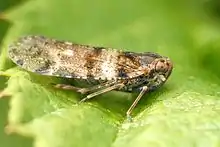Cixiinae
Cixiinae is a planthopper subfamily in the family Cixiidae. It is one of three such subfamilies, the other two being the Bothriocerinae and the Borystheninae.[1] While a few species had been tested in a larger study of the Fulgoroidea,[2] neither the Cixiinae nor its tribes were analysed cladistically until 2002.[1][3] Resolution of tribal relationships is incomplete and additional testing of the tribes with samples larger than one per tribe is needed.[4]
| Cixiinae | |
|---|---|
 | |
| Cixius nervosus | |
| Scientific classification | |
| Kingdom: | Animalia |
| Phylum: | Arthropoda |
| Class: | Insecta |
| Order: | Hemiptera |
| Infraorder: | Fulgoromorpha |
| Family: | Cixiidae |
| Subfamily: | Cixiinae |
| Tribes | |
| |
Tribes
In 1938 Metcalf divided the Cixiinae into tribes, including the Cixiini and Oecleini of Muir;[5] however, those divisions were seldom referred to and remained unanlaysed for decades.[2] Subsequently, the Stenophlepsiini were returned to the Cixiinae, and the Pentastirini were subdivided into the Pentastirina and Oliarina subtribes.[2][6] However, Oliarina was later synonymized under Pentastirina.[7] In 2002, Emeljanov created seven new tribes[3][4] and in 2004 subtribe Mnemosynina of tribe Pentastirini was raised to tribal level as the Mnemosynini.[8]
Currently there are sixteen recognized tribes, although some tribes lack adequate description:[4]
- Andini Emeljanov, 2002
- Bennarellini Emeljanov, 1989
- Bennini Metcalf, 1938
- Brixidiini Emeljanov, 2002
- Brixiini Emeljanov, 2002
- Cajetini Emeljanov, 2002
- Cixiini Muir, 1923 - non-monophyletic[4]
- Duiliini Emeljanov, 2002
- Eucarpiini Emeljanov, 2002 - monophyletic[4]
- Gelastocephalini Emeljanov, 2000 - putatively monophyletic[4]
- Mnemosynini Szwedo, 2004 - monophyletic[4]
- Oecleini Muir, 1922 - non-monophyletic[4]
- Pentastirini Emeljanov, 1971 - monophyletic[4]
- Pintaliini Metcalf, 1938 - non-monophyletic[4]
- Semonini Emeljanov, 2002 - putatively monophyletic[4]
- Stenophlepsiini Metcalf, 1938
References
- Larivière, Marie‐Claude & Hoch, Hannelore (1998). "The New Zealand planthopper genus Semo White (Hemiptera: Cixiidae): taxonomic review, geographical distribution, and biology" (PDF). New Zealand Journal of Zoology. 25 (4): 429–442, page 429. doi:10.1080/03014223.1998.9518166. Archived (PDF) from the original on 9 January 2014.
- Emeljanov, A. F. (1989). "To the problem of division of the family Cixiidae (Homoptera, Cicadina)" (PDF). Entomological Review. 68 (4): 54–67. Archived (PDF) from the original on 9 January 2014.
- Emeljanov, A. F. (2002). "Contribution to classification and phylogeny of the family Cixiidae (Hemiptera, Fulgoromorpha)" (PDF). Denisia. 4: 103–112. Archived (PDF) from the original on 9 January 2014.
- Ceotto, Paula; Bourgoin, Thierry (2008). "Insights into the phylogenetic relationships within Cixiidae (Hemiptera: Fulgoromorpha): cladistic analysis of a morphological dataset" (PDF). Systematic Entomology. 33 (3): 484–500. doi:10.1111/j.1365-3113.2008.00426.x. Archived (PDF) from the original on 9 January 2014.
- Metcalf, Zeno Payne (1938). "The Fulgorina of Barro Colorado and other parts of Panama". Bulletin of the Museum of Comparative Zoology. 82 (5): 277–423.
- Emeljanov, A. F. (1971). "New genera of leafhoppers of the families Cixiidae and Issidãe (Homoptera, Auchenorrhyncha) in the USSR" (PDF). Entomological Review (Энтомологическое обозрение). 50 (3): 350–354. Archived (PDF) from the original on 9 January 2014.
- Holzinger, W. E.; Emeljanov, A. F.; Kammerlander, I. (2002). "The family Cixiidae Spinola 1839 (Hemiptera: Fulgoromorpha)–a review" (PDF). Denisia. 4: 113–138. Archived (PDF) from the original on 9 January 2014.
- Szwedo, Jacek (2004). "Autrimpus sambiorum gen. and sp. nov. from Eocene Baltic amber and notes on Mnemosynini stat. nov. (Hemiptera: Fulgoroidea: Cixiidae)". Annales Zoologici. BioOne (Museum and Institute of Zoology at the Polish Academy of Sciences). 54 (3): 567–578. Abstract